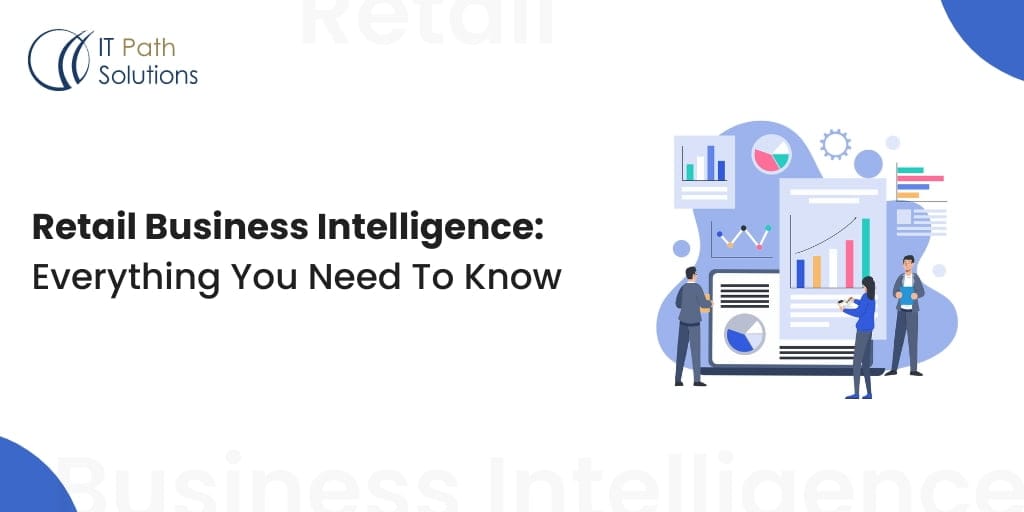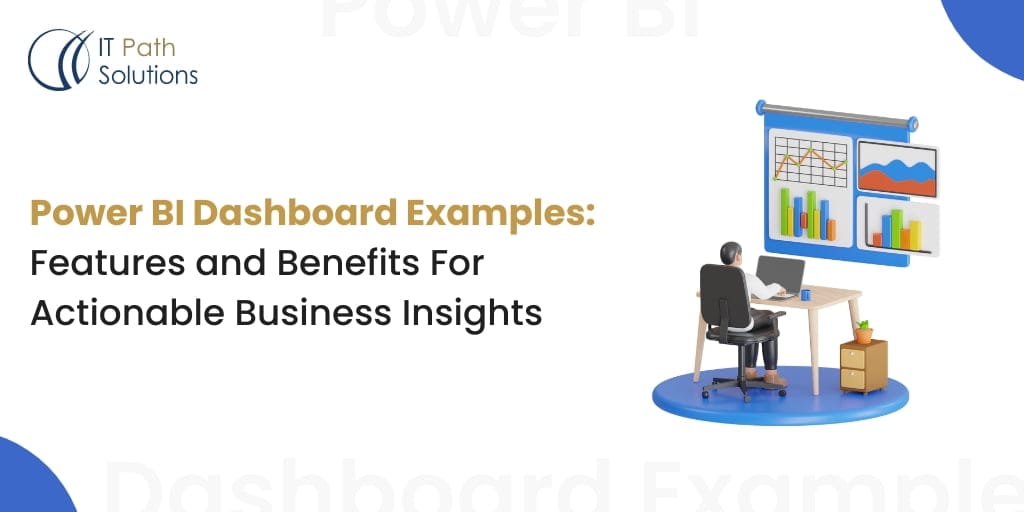Mobile Business Intelligence: Comprehensive Guide & Key Insights

The growing reliance on mobile devices has revolutionized how businesses function. Today, decision-makers expect real-time access to business-critical information—anytime and anywhere. Mobile Business Intelligence (Mobile BI) bridges this gap, combining the power of traditional BI tools with the convenience of mobility, transforming how organizations analyze, share, and act on data.
This guide delves into Mobile BI solutions, their benefits, key features, implementation strategies, and the future of mobile business intelligence software.
What is Mobile Business Intelligence?
Mobile business intelligence refers to the ability to access, explore, and analyze business data and insights through mobile devices like smartphones and tablets. By extending traditional BI capabilities to mobile platforms, mobile BI ensures real-time access to critical information, empowering organizations to make data-driven decisions regardless of location.
Key benefits of mobile business intelligence software include:
- Real-time decision-making.
- Enhanced organizational agility.
- Improved responsiveness to market trends.
The Rise of Mobile Business Intelligence
The demand for business intelligence mobile solutions has skyrocketed as organizations strive to keep up with the growing need for data-driven decision-making. With mobile devices becoming indispensable, the global mobile BI market is projected to reach $16.3 billion by 2026, growing at a compound annual rate of 16.1%.
Common Features of Mobile BI Solutions
Mobile BI solutions are designed to enhance usability and functionality, ensuring seamless integration into business operations. Key features include:
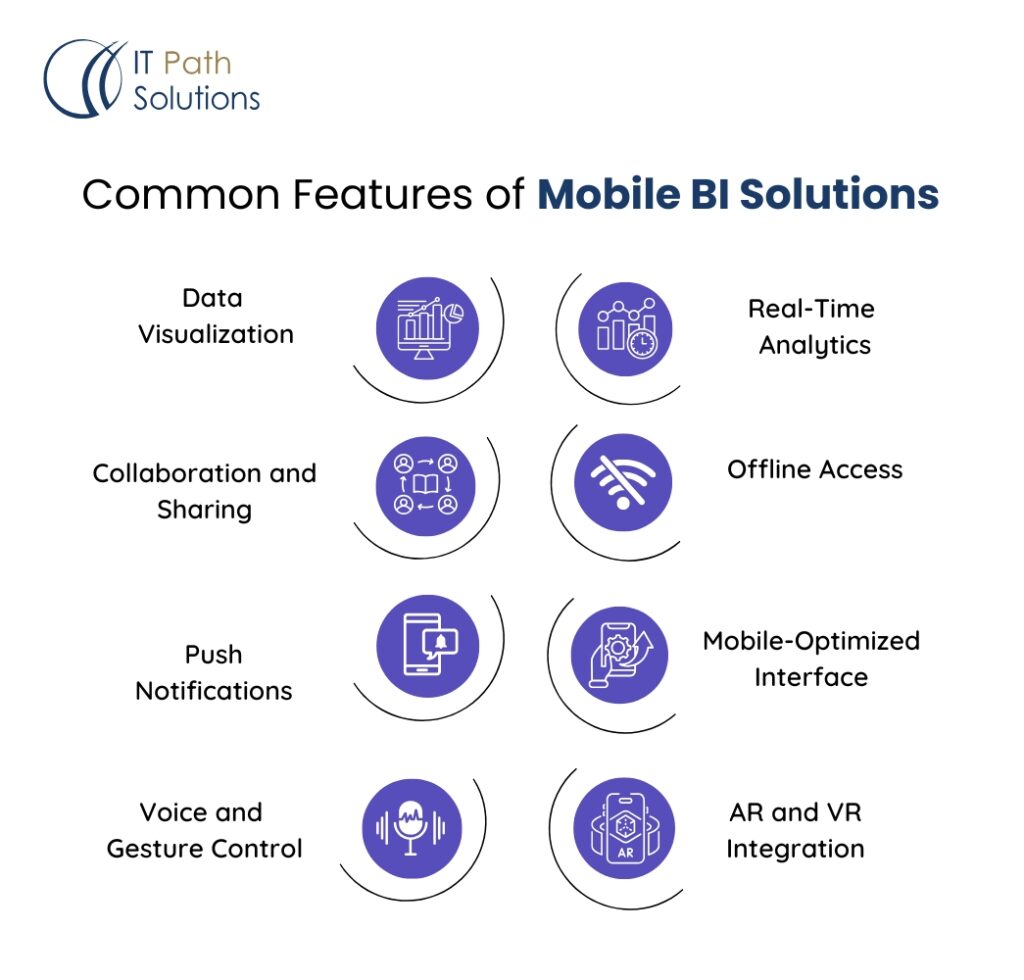
- Data Visualization: Interactive dashboards, charts, and graphs optimized for mobile devices make complex data easy to understand.
- Real-Time Analytics: Instant updates ensure decisions are made with the most current information.
- Collaboration and Sharing: Tools for sharing reports, annotations, and insights foster teamwork.
- Offline Access: Access data and reports even without an internet connection.
- Push Notifications: Stay informed with alerts about critical events or data changes.
- Mobile-Optimized Interface: Intuitive designs ensure smooth navigation, even in low-connectivity areas.
- Voice and Gesture Control: Advanced applications allow hands-free interaction for enhanced accessibility.
- AR and VR Integration: Augmented and virtual reality features provide immersive data exploration experiences.
Benefits of Mobile Business Intelligence
Adopting mobile BI solutions brings numerous advantages, transforming how organizations operate:
- Increased Accessibility: Real-time access to data improves decision-making.
- Faster Responses: Quick access to actionable insights ensures rapid decision-making.
- Improved Productivity: Employees can analyze and act on data from anywhere, increasing efficiency.
- Enhanced Collaboration: Teams can share insights and work together seamlessly using business intelligence mobile platforms.
- Competitive Edge: Organizations using mobile business intelligence software are better equipped to adapt to market changes.
Mobile BI Access Methods
Mobile BI can be delivered through several access models, each with distinct advantages and trade-offs. The right choice depends on organizational needs, budget, and user preferences. Here are the most common methods:
1. Web-based Mobile BI Applications
Web-based mobile business intelligence software is accessible via web browsers on mobile devices and optimized for smaller screens. These apps provide cross-platform compatibility and are quick to deploy.
Advantages:
- Cost-effective and platform-independent.
- Requires no installation, making it easier to implement.
Disadvantages:
- Limited offline functionality.
- Relies on stable internet connectivity for optimal performance.
Example: Retailers can track sales trends and inventory levels across stores using a web-based mobile BI solution, reducing the need for device-specific apps.
2. Native Mobile BI Applications
Native apps are developed for specific operating systems like iOS or Android, providing a seamless, optimized experience for users.
Advantages:
- High performance with fast response times.
- Full access to device features, such as offline mode and push notifications.
Disadvantages:
- Expensive and time-intensive to develop for multiple platforms.
- Maintenance can be challenging for diverse device ecosystems.
Example: Financial institutions use native mobile BI tools to deliver real-time market analysis and investment insights, empowering brokers on the go.
3. Hybrid Mobile BI Applications
Hybrid apps combine features of web and native applications. Built with web technologies, they are wrapped in a native shell to access device-specific capabilities.
Advantages:
- Easier and less expensive to develop than fully native apps.
- Compatible across multiple platforms.
Disadvantages:
- Limited performance compared to purely native apps.
- Dependency on internet connectivity for advanced features.
Example: Manufacturing firms use hybrid business intelligence mobile applications to monitor equipment performance and production metrics in real time.
Choosing the right model depends on organizational objectives, user needs, and existing infrastructure. Each method has unique strengths, making it essential to align the approach with the desired business outcomes.
Best Mobile BI Tools in the Market
Choosing the right mobile BI solutions is crucial for maximizing efficiency and meeting organizational goals. Here are some top tools:
- Sisense: Offers visually engaging dashboards and seamless collaboration tools for mobile devices.
- SAP Roambi Analytics: Focuses on real-time analytics and intuitive mobile interfaces.
- Microsoft Power BI Pro: Combines powerful analytics with integration across Microsoft tools.
- IBM Cognos Analytics: Provides comprehensive mobile data analysis capabilities.
- Amazon QuickSight: Scalable, AWS-backed analytics with machine learning integration.
- Tableau Mobile: Intuitive and user-friendly for real-time interaction with Tableau dashboards.
- MicroStrategy Mobile: Secure, enterprise-grade mobile BI with advanced encryption.
- Qlik Sense Mobile: Simplifies data exploration with modern interfaces and robust analytics.
Implementing Mobile Business Intelligence
A successful mobile business intelligence strategy requires careful planning and execution. Here are key steps:
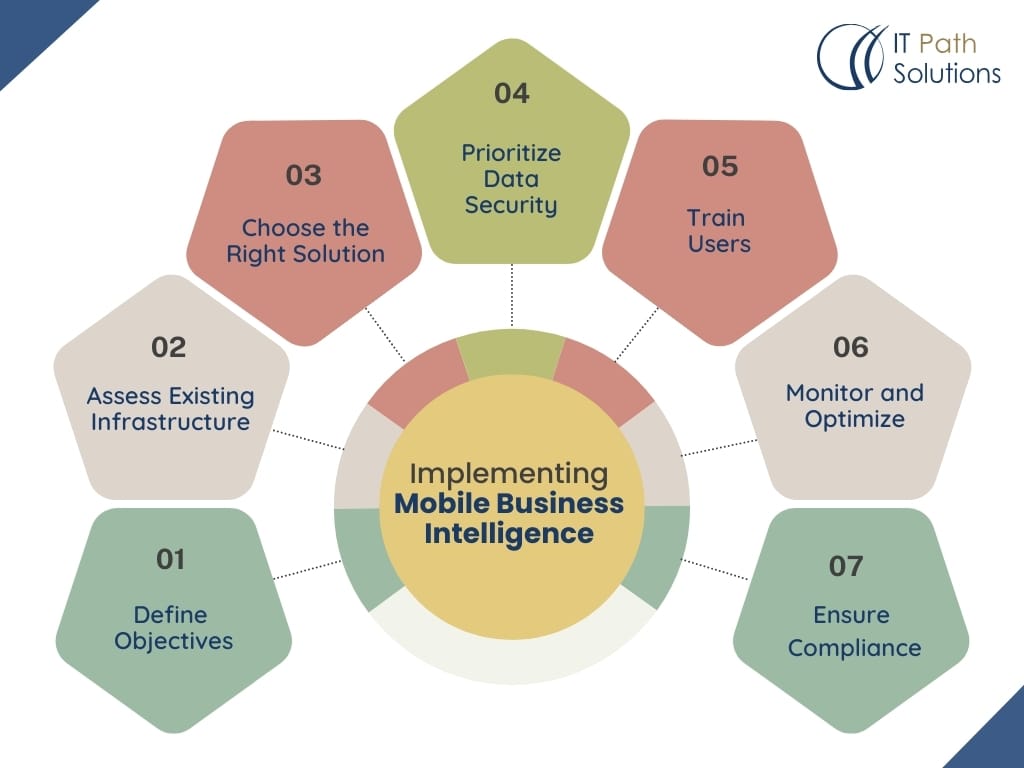
- Define Objectives: Identify goals and expected outcomes from mobile BI adoption.
- Assess Existing Infrastructure: Evaluate current systems and identify gaps.
- Choose the Right Solution: Select tools based on scalability, security, and integration needs.
- Prioritize Data Security: Implement encryption, access controls, and governance policies.
- Train Users: Offer training to ensure widespread adoption and effective use of tools.
- Monitor and Optimize: Regularly evaluate system performance and make improvements.
- Ensure Compliance: Align deployment with industry regulations and data protection laws.
For organizations seeking expert guidance, Power BI Consulting Services can provide tailored strategies and solutions to maximize the potential of your business intelligence initiatives.
Industry-Specific Examples
Mobile BI in Retail:
Retail chains use mobile business intelligence to track real-time sales, inventory levels, and customer preferences. For instance, store managers can identify high-demand products and make restocking decisions on the go using mobile BI dashboards.
Mobile BI in Healthcare:
Healthcare providers leverage mobile BI solutions to monitor patient data, hospital performance metrics, and resource utilization. For example, a hospital administrator can quickly check bed occupancy rates and reallocate resources in real time.
Mobile BI in Manufacturing:
Manufacturers use business intelligence mobile platforms to oversee supply chain logistics and equipment performance. For instance, plant managers can receive alerts about machine downtimes and initiate maintenance through mobile BI apps.
Mobile BI in Finance:
Financial institutions utilize mobile BI software to analyze transaction patterns and monitor risk indicators. A financial analyst, for example, can access real-time market trends and portfolio updates while attending a client meeting.
Mobile BI in Logistics and Supply Chain:
Logistics companies use mobile BI to optimize delivery routes, track shipments, and monitor fleet performance. For instance, a logistics manager can adjust delivery schedules in real time based on traffic or weather conditions.
Mobile BI in Hospitality:
Hotels and resorts leverage mobile BI solutions to monitor guest satisfaction, occupancy rates, and operational efficiency. For example, hotel managers can review guest feedback and make instant service improvements using mobile BI tools.
Challenges of Mobile BI
Despite its benefits, implementing mobile BI solutions comes with challenges:
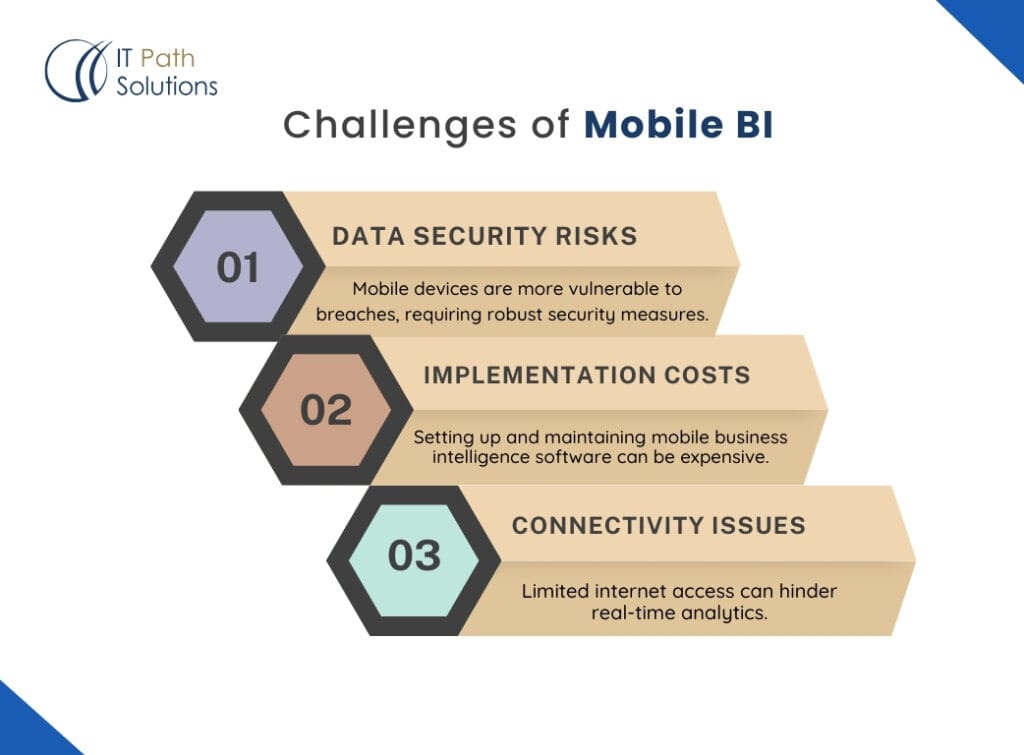
- Data Security Risks: Mobile devices are more vulnerable to breaches, requiring robust security measures.
- Implementation Costs: Setting up and maintaining mobile business intelligence software can be expensive.
- Connectivity Issues: Limited internet access can hinder real-time analytics.
The Future of Mobile Business Intelligence
The future of mobile BI lies in integrating advanced technologies like artificial intelligence, machine learning, and augmented reality. These innovations will redefine how users interact with data, offering predictive insights and immersive experiences.
As organizations continue to prioritize agility and data-driven strategies, mobile business intelligence solutions will remain integral to driving growth and competitiveness.
Conclusion
Mobile Business Intelligence is more than a trend—it’s a transformative tool that empowers organizations to adapt and thrive in a data-driven world. By leveraging mobile BI solutions, businesses can enhance productivity, improve decision-making, and gain a competitive edge.
Whether you’re exploring tools like Tableau Mobile or implementing a comprehensive mobile business intelligence strategy, the opportunities are endless. Embracing mobile business intelligence software today ensures your organization is prepared for the challenges and opportunities of tomorrow.
 Healthcare
Healthcare  Education
Education  Real Estate
Real Estate  Logistic
Logistic  Themes
Themes
 Plugins
Plugins
 Patterns
Patterns
